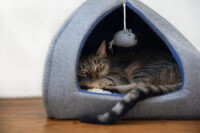Cats are known for their refined senses, reacting to the slightest changes in their environment, from an empty food bowl to unfamiliar sounds. This heightened sensitivity, while crucial for survival in the wild, can become a source of stress for domestic cats, leading to noise aversion. If your feline friend seems overly sensitive to everyday Cat Noise, it might be more than just being finicky.
Noise aversion in cats is a genuine concern that can affect them year-round, not just during loud events like fireworks. At Just Cats Clinic, our team understands the complexities of cat noise aversion and how it impacts your beloved pet. We’re here to explain what noise aversion is, the common signs to look for, and effective strategies to help your cat cope with startling sounds and regain their peace of mind.
What is Cat Noise Aversion?
Cat noise aversion, at its core, is a fear-based response to specific sounds or loud noises. It typically develops as a reaction to sudden, unpredictable loud noises such as thunderstorms, fireworks, or gunshots. However, a variety of everyday cat noise triggers can also initiate this fear response, including:
- Traffic sounds
- Construction noise
- Loud music or television
- Children playing loudly
- Vacuum cleaners
- Noisy household appliances
- Heavy machinery
Noise aversion is a common issue among pets, yet it frequently goes unnoticed in cats. This is often because cat owners may miss the subtle signs of stress that indicate their feline is fearful of a particular cat noise. Several factors can contribute to a cat developing noise aversion. Genetics can play a role, as can inadequate socialization during kittenhood. Traumatic past experiences, especially for rescue cats or those who were once strays, can also increase susceptibility. Furthermore, living in a chaotic or noisy environment can make a cat more prone to developing this condition.
Recognizing the Signs of Cat Noise Aversion
Identifying cat noise aversion can be more challenging than in dogs, as cats are naturally inclined to be secretive and often retreat when stressed. While some cats might become clingy when nervous, many prefer to hide when they hear frightening sounds. If a sudden or loud cat noise occurs, observe your cat for these common signs of noise aversion:
- Hiding or seeking secluded spaces
- Attempting to escape or run away
- Pacing back and forth in agitation
- General restlessness and inability to settle
- Dilated pupils (widened eyes)
- Excessive vocalization, such as meowing, hissing, or yowling
- Hypervigilance, appearing constantly on alert
- Trembling or shaking
- Excessive salivation or drooling
- Overgrooming, sometimes to the point of causing bald patches
- Inappropriate urination or defecation outside the litter box
 A frightened cat hiding under furniture, illustrating cat noise aversion.
A frightened cat hiding under furniture, illustrating cat noise aversion.
5 Proven Strategies to Help Your Cat Manage Noise Aversion
While cat noise aversion can be a complex behavioral issue, there are several effective strategies you can implement to minimize your cat’s fear and help them cope with their sound triggers. During known loud events like fireworks or thunderstorms, or whenever startling cat noise occurs, try these five methods to ease your cat’s distress:
-
Reduce Exposure to Loud Cat Noise: Minimizing your cat’s exposure to the sounds that trigger their aversion is a crucial first step. If you know a particular cat noise, like the vacuum cleaner, is stressful, take preventative measures. For instance, when vacuuming, ensure your cat is safely in a room far away from the noise. Creating distance between your cat and the source of loud cat noise can significantly reduce their anxiety.
-
Maintain Calmness During Disturbing Sounds: Cats are incredibly perceptive to their owner’s emotions. If you become anxious because your cat is anxious, it can amplify their distress. When a thunderstorm rolls in or fireworks begin, remain calm yourself. Avoid fussing over your cat excessively or scolding them. Constantly repeating “It’s okay” in a high-pitched, stressed voice can actually increase your cat’s anxiety, as they sense your unease. Instead, speak to your cat in a soothing, gentle tone, offer soft petting, and try to distract them with a favorite toy or gentle play.
-
Establish a Secure Sanctuary for Your Cat: When you anticipate a potentially noisy event, such as a party or home renovations, proactively create a safe and quiet haven for your cat. Choose the most sound-insulated room in your home and transform it into a feline retreat. Equip it with a high perch, a cozy hiding spot like a cat cave or covered bed, a food puzzle to keep them engaged, an interactive toy, and a calming pheromone diffuser. Playing white noise, calming classical music, or even a nature documentary can further enhance the peaceful atmosphere and help mask external cat noise.
-
Foster Positive Associations with Loud Cat Noise (Desensitization): To help your cat develop a less fearful response to cat noise, you can try a desensitization approach. Start by identifying recordings of the sounds that trigger your cat’s aversion – many sound apps offer options for thunderstorms, fireworks, etc. Begin playing the sound at a very low volume, one that doesn’t elicit any anxiety signs in your cat. While the sound is playing at this comfortable level, reward your cat with their favorite treats. Gradually and very slowly increase the volume over multiple sessions, always observing your cat for any signs of distress. If you notice anxiety, reduce the volume back down. This process requires patience and consistency, but over time, it can help reduce your cat’s fear response.
-
Seek Professional Veterinary Guidance: Without proper management, cat noise aversion often worsens over time, potentially leading to significant emotional and even physical health issues for your cat. Even if your cat’s anxiety to loud cat noise seems mild, early intervention is key. Consult with your veterinarian at Just Cats Clinic to develop a comprehensive treatment plan. This plan may include nutraceuticals, prescription medications for anxiety, and other calming aids. These can be used on an as-needed basis for predictable loud events or as a long-term strategy to manage generalized anxiety and reduce cat noise aversion overall.
Don’t wait until the next loud event to address your cat’s cat noise aversion. Schedule an appointment with our compassionate team at Just Cats Clinic today to discuss the best strategies for soothing your feline friend’s fear of loud sounds and ensuring their long-term well-being.


